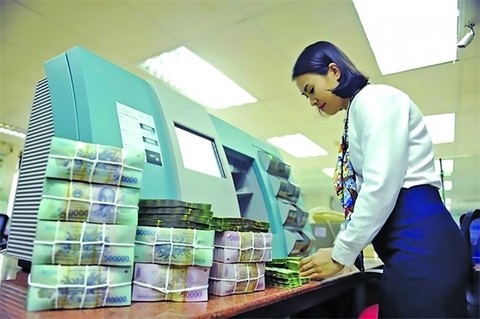|
Credit continues to decline in February 2024
After declining in the first month of 2024, credit of the banking system continued to decrease in February this year.

A bank teller counts money at a transaction office in Hà Nội. Credit of the banking system as of February 16 this year decreased by 1 per cent compared to the end of last year. — VNA/VNS Photo
|
A Viet Dragon Securities (VDSC) report released recently said, according to estimates by the State Bank of Vietnam (SBV), the credit of the banking system as of February 16 this year decreased by 1 per cent compared to the end of last year. In January, credit decreased by 0.6 per cent.
Low credit growth in the first months of a year is common. The average credit growth in the first two months in the 2013-23 period was 0.56 per cent. Credit declines in the first two months were also seen, in 2014, 2018 and 2024.
However, according to VDSC experts, although there is no official data as of the end of February 2024, the credit decrease in the first two months of 2024 seems more serious because this year's conditions are different from the previous years, as the State Bank of Vietnam (SBV) this year assigned the entire credit growth quota of 15 per cent for commercial banks right in the first month of this year, instead of only allocating a part of the quota at the beginning of the year as previously.
Early this month the SBV also sent an official dispatch to credit institutions stating that despite the application of supporting policies to boost credit from the beginning of the year, credit growth this year is still quite low compared to recent years.
To boost credit growth, the SBV requested credit institutions to firmly implement effective credit growth solutions right from the beginning of the year. Credit must focus on production, business and the Government’s priority sectors, as those are the country’s economic growth drivers. Banks also need to strictly control credit for potentially risky sectors to ensure safe and effective operations.
Not only was credit growth negative in the first two months of this year, capital mobilisation of the economy was also not positive. According to VDSC, as of February 16 this year, raised capital is estimated to decrease by 1.6 per cent compared to the end of 2023.
Though capital mobilisation growth in the first months of a year often slowed in the past years, the capital raising as of February 16 was lower than previous years.
The capital mobilisation decline in the first two months of this year has exacerbated a liquidity shortage in the banking system in the period, which pushed up the overnight interest rate in the interbank market to more than 4 per cent last week, the highest level in the past nine months.
Bizhub
|